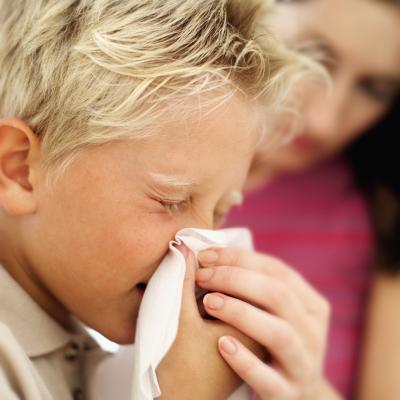On average, children catch a cold between six and eight times each year, according to the University of Rochester Medical Center. Children don’t literally “catch” colds, of course, but upper respiratory infections are extremely contagious and common, especially in kids who attend daycare or school full-time. Colds are not usually serious. Most are easily treatable with home remedies.
Causes
Colds are viral diseases. More than half of all colds are caused by either rhinoviruses or coronaviruses. Some colds are caused by unknown viruses, according to the Children’s Hospital Boston. The viruses live in the mucus that lines the nose and throat, causing it to become inflamed and irritated. The reaction of the body’s immune system to the virus, coupled with the inflamed mucus membranes, causes the common symptoms of a cold.
Symptoms
The symptoms of a cold vary, depending on the age of the child. Infants with a cold may be unusually fussy, have trouble sleeping, or develop a fever, according to Children’s Hospital Boston. Infants may also have congested or runny noses. Older children often suffer from a scratchy or sore throat, coughing, sneezing, a dripping nose, general aches and pains and, sometimes, a mild fever. The latter is especially important, as the difference between flu and cold symptoms is often the fact that the flu presents with a higher fever.
Prevention
Cold viruses spread through the air or through direct contact, according to the University of Rochester Medical Center. A child can get a cold when she touches a surface that contains a cold virus, or when she inhales air that is contaminated with a cold virus. For this reason, children should be encouraged to wash their hands frequently, and they should be kept away from people who have colds.
Treatments
Colds cannot be cured, but a child can be kept comfortable while the virus runs its course. Make sure your child drinks lots of fluids. Electrolyte solutions are recommended for older children who have colds, according to WebMD. Babies with colds should be breastfed on demand. Acetaminophen or ibuprofen — but never aspirin, which can cause a rare and dangerous disease in children — can be given to treat a fever or reduce aches and pains in the body. A spoonful of honey can quiet a cough. Give no more than 1 tsp. to children ages 6 through 11, and 1/2 tsp. to children ages 2 to 5. Younger children should not be given honey. Saline nose drops moisten an infant or child’s dry nose and break up mucus, making it easier for them to breathe. A clean, cool humidifier placed in the child’s room does the same. If your child has a sore throat, give him soft, cool foods to soothe it. Finally, elevate your child’s bed so he can breathe easier.
Warning
Do not give a child under the age of 6 any over-the-counter cold medicine. In fact, you might want to hold off giving your child cold medicine until she is over the age of 12, suggests “Consumer Reports” magazine’s website. Trials show that cold and cough medicines targeted for children do not help. On the contrary, it is all too easy for parents to give their children too much of these medications inadvertently, causing an overdose, which is far more dangerous than the actual cold symptoms themselves.





